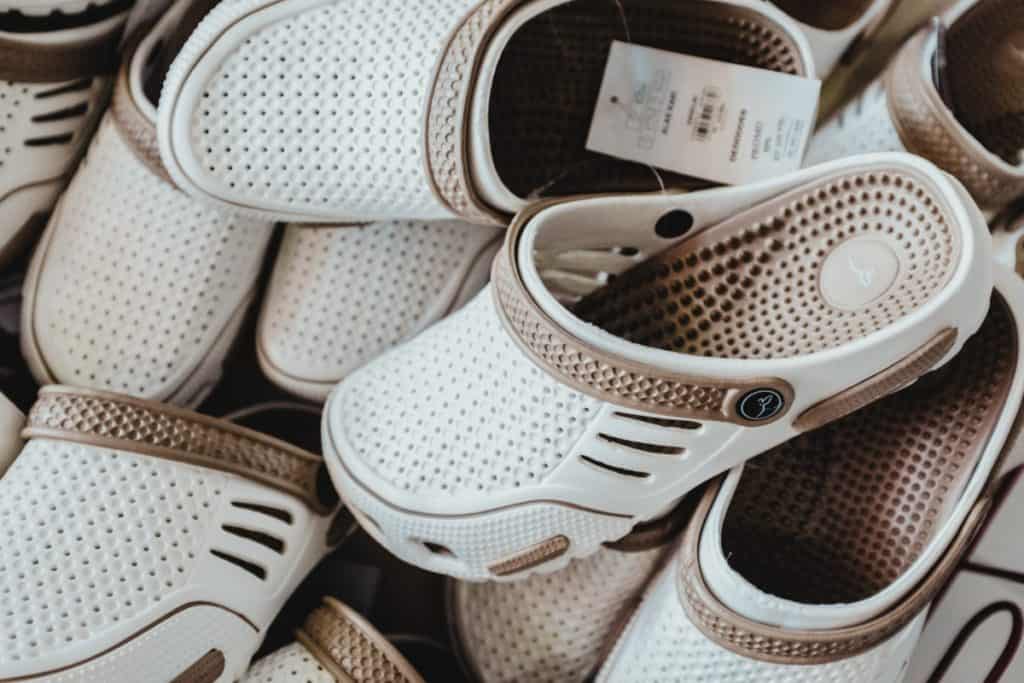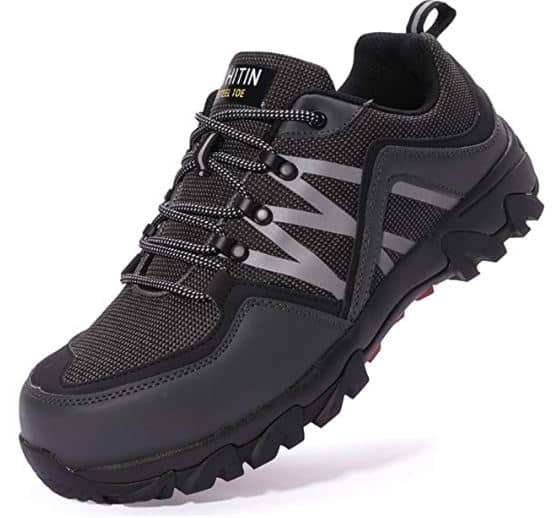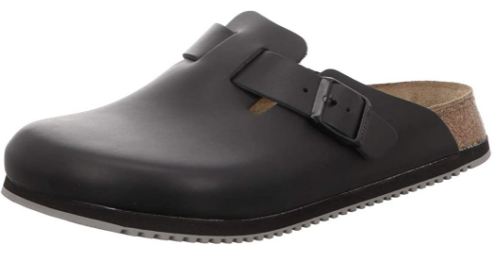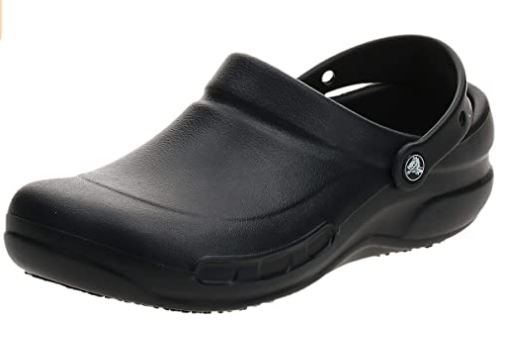
A career as a chef requires that we are on our feet for countless hours every day. Perhaps the two most vital things we can’t live without are a good set of knives and a comfortable pair of chef shoes.
Anyone interested in a career in catering may be wondering what shoes are best for chefs? and why they always seem to see chefs wearing clogs, after all aren’t these a little old fashioned?
We’ll take a look at the most popular kinds of footwear used by kitchen staff and answer the question, why do chefs wear clogs?
Chefs wear clogs because we are working on our feet all day long and clogs are an extremely comfortable type of footwear. They are breathable, non-slip, and can easily be removed if any hot liquids are spilt.
So that’s the basic answer, but I’m sure readers are thinking surely other types of footwear would do the same job but look a little more stylish? Let’s take a look.
What Kind of Shoes Do Chefs Wear?

Some chefs choose to wear trainers, and this is perfectly acceptable as long as they have non-slip soles. However, the vast majority of chefs favour clogs as they are superior in many ways.
There are three main types of shoes that chefs will wear.
- There are kitchens that insist on their kitchen staff wearing steel toe capped shoes to protect their feet from heavy dropped items. If a kitchen issues shoes to its staff
 as part of a PPE process, unfortunately these are the type you are likely to be stuck with.
as part of a PPE process, unfortunately these are the type you are likely to be stuck with.
Thankfully these places are rare! Although it may be safer in some instances, the extra weight of the steel toe caps may not sound like much, but after a 12 hour shift you cannot wait to take your shoes off!
you cannot wait to take your shoes off!
- The second option for chefs is trainers. These are not regular trainers as they must have non-slip soles. To not have non-slip soles would be so dangerous in a kitchen
 . These are comfortable but as anyone who has worn trainers for a long amount of time will know, trainers are not the most breathable (athletes foot anyone?)
. These are comfortable but as anyone who has worn trainers for a long amount of time will know, trainers are not the most breathable (athletes foot anyone?)
- The third and most popular shoes option for chefs is clogs!
Why Do Chefs Wear Clogs?
Chefs wear clogs because they are the best option available in terms of allowing our feet to breath, whilst also being very comfortable.
It may be true that clogs are not the most stylish of footwear, and I can’t imagine many chefs choosing to wear their clogs when going out for drinks, but in a kitchen environment they are perfect.
they are perfect.
The open nature of clogs allows the air to circulate around the feet, keeping them cool . Some chefs choose to go sock-less, although this is personal preference and not something I ever subscribed to.
. Some chefs choose to go sock-less, although this is personal preference and not something I ever subscribed to.
Non-slip soles provide the protection from falling over that is vital. Be careful when buying clogs for a kitchen as not all have non-slip soles, the cheaper options usually do not. Non-slip soles will be specifically stated and unfortunately cost a little more.
The sole of the clog is very comfortable on our feet. The soft feel ensures that our feet are not sore at the end of a long day which is really quite impressive.
Depending on the brand that we buy, some of them truly mould to the shape of your foot so they fit like a glove. There are two main brands favoured by chefs, these are Crocs and Birkenstocks .
.
Why Do Chefs Wear Birkenstocks?

Birkenstocks are a favourite among chefs due to the fact that the sole is made of a cork like material that moulds to the shape of our feet. This makes them so comfortable to wear over the course of a long day.
Anyone who has not tried a pair of Birkenstock shoes is really missing out. When they are fresh out of the box the insole is flat. Over the course of about a week the cork like substance gradually moulds to the shape of your feet.
What could be more comfortable to wear all day long then a pair of shoes moulded to your feet?
Another advantage of Birkenstocks is that they are made of leather which becomes very soft and subtle around the top of the foot. Once they are ‘broken in’ it is very rare to get a blister wearing a pair even after a 60 hour week on our feet.
week on our feet.
The leather feels like it adds another layer of protection against hot liquids. Generally the toe area is sealed so when the odd spillage occurs the shoe can be slipped off and the leather wiped without any problems.
The disadvantage of Birkenstocks for chefs, is that they can become hard over time and need replacing fairly regularly. The cork soles that mould to your feet seem to loose their sponginess after a while.
This hard sole becomes uncomfortable and a new pair is needed. As a guide I tended to find mine needed replacing every 1-2 years, so not bad when you consider the miles that are walked in them every day.
Another disadvantage of the Birkenstocks is that they are quite expensive. They cost around £80, (link to amazon here to check the price as they often sales in place) which is significantly more when compared with the Croc option we will look at below.
Why Do Chefs Wear Crocs?

Chefs like to wear Crocs because they are extremely breathable and comfortable. The gummy texture ensures that the soles of our feet are not sore after a long day in the kitchen, and there are no dangers of any blisters.
Some chefs favour Crocs over Birkenstocks because they feel that Birkenstocks are a little too hard, and don’t like the fact they need replacing relatively frequently.
over Birkenstocks because they feel that Birkenstocks are a little too hard, and don’t like the fact they need replacing relatively frequently.
Crocs do not require moulding to our feet, so they are comfortable straight out of the box which is a big selling point for many.
The material they are made from is also extremely breathable. Those that find the leather of Birkenstocks a little too restrictive love the thin gummy feel of the Crocs. I’ll link to them on amazon here so readers can check the current price.
Which Are The Best Shoes for Chefs, Birkenstocks or Crocs?
Both Birkenstocks and Crocs are extremely popular chef shoes for good reasons. However, having tried both types over a career spanning many years, my personal favourites are the Birkenstocks.
To clarify this, I mean I originally wore Birkenstocks, then when they needed replacing I switched to Crocs. They were perfectly fine and I wore them for a long time but after about a year 1 switched back to Birkenstocks.
I personally feel like the Crocs do not have the structure that I like. My feet always felt a little vulnerable in a gummy material compared to a nice soft leather.
in a gummy material compared to a nice soft leather.
Both types are very comfortable but I particularly enjoy the way that the Birkenstocks mould to your feet, even if the first few days in them are not the most comfortable.
Do All Chefs Wear Clogs?
Although clogs are a very popular type of footwear among chefs they are not loved by everyone. Some find that they slip of accidentally when walking around, or that they are having to constantly grip the clog with their toes to stop it falling off.
In the kitchens I have worked in, the majority of chefs wear clog type shoes, with probably a 50/50 split between Birkenstocks and Crocs. This is obviously not a very scientific method just my observations over the years!
in, the majority of chefs wear clog type shoes, with probably a 50/50 split between Birkenstocks and Crocs. This is obviously not a very scientific method just my observations over the years!
Shoes are a very personal thing though, and some chefs just prefer the trainer type. Most beginners seem to start with these trainer style shoes (linked to amazon here) and progress into the clogs when they get a bit more comfortable thinking of themselves as a chef.
seem to start with these trainer style shoes (linked to amazon here) and progress into the clogs when they get a bit more comfortable thinking of themselves as a chef.
I’ve yet to meet a chef who prefers the steel toe cap type!
I hope this post has been a useful guide. Please take some time to look around the site where we answer all your chef related questions!
